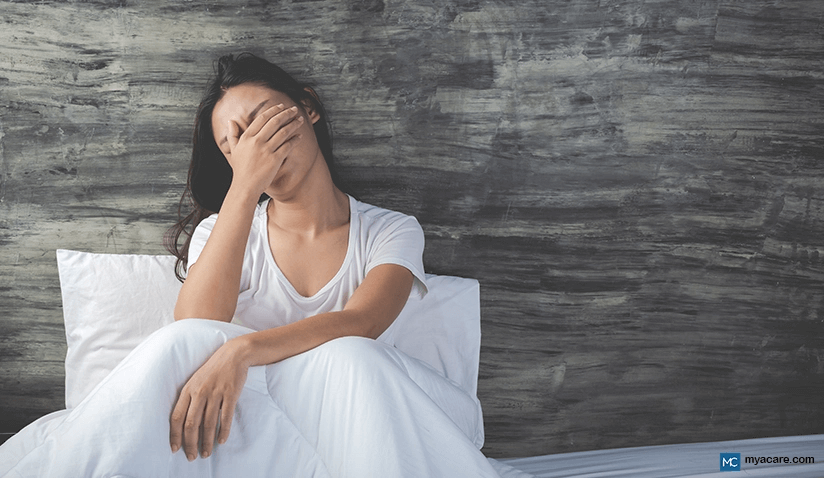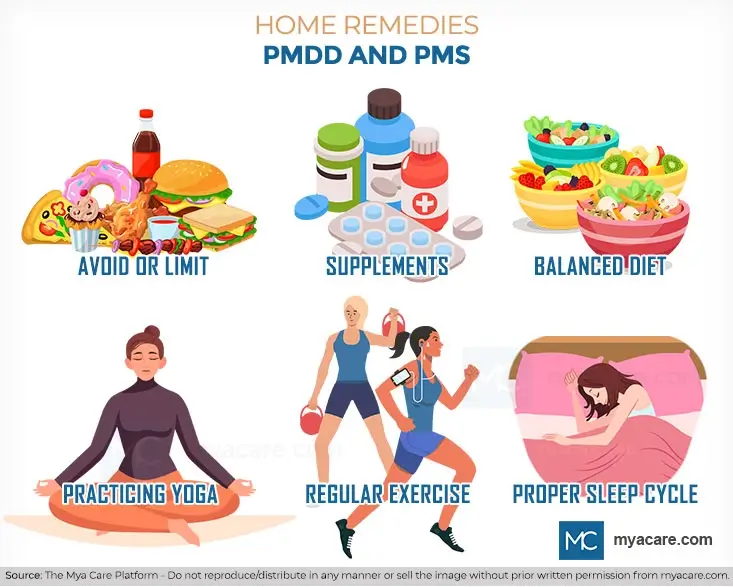The Truth About Menstrual Depression, and Helpful Treatments

It is very common for women to experience hormonal changes that can affect mood and behavior during their menstrual cycle (1). This can, in turn, contribute to problems with mood disorders such as dysphoria. Studies reviewed on the link between depression and the menstrual cycle help to shed light on this topic by identifying key elements that characterize these disorders and providing insight into how these disorders are conceptualized (2).
Depression is a disorder that afflicts millions of people all over the world every single day. It is also a very common symptom of PMS, also known as Premenstrual Syndrome (3).
Premenstrual Syndrome (PMS)
Every month, from puberty to menopause, a woman's body undergoes a series of changes throughout the menstrual cycle. It involves the development and release of an ova (the eggs) from the ovaries, followed by the shedding of an egg each month. The menstrual cycle depends on hormones released by the pituitary gland in the brain and those produced by the ovaries (4).
The luteal phase is the second phase of the menstrual cycle, during which hormonal changes can cause a very low mood in some people (4). At this stage, estrogen levels peak while testosterone levels drop dramatically, causing premenstrual syndrome (PMS).
The fluctuations in these hormones can affect brain chemicals called neurotransmitters. Dopamine and serotonin are quick examples of these neurotransmitters that affect (5);
- Mood (sadness, irritability),
- sleep,
- motivation, and
- food cravings.
These can also be characterized as symptoms of PMDD, a menstruation-related mood disorder that has more severe symptoms compared to PMS.
Premenstrual dysphoric disorder (PMDD)
PMDD stands for Premenstrual dysphoric disorder, which affects about 5% to 10% of the female population. Women can experience PMDD at some point in their lives, although it is more common in women over 30 (6).
One of the major symptoms of PMDD is severe depression. This can affect a woman’s day-to-day activities and their interactions with others in some cases (7).
Studies have shown that about 15% of women who experience PMDD will attempt suicide in their life, which makes PMDD a very severe problem among the female population that more people need to be made aware of (7).
While the exact causes of PMDD are still unknown, hormones are thought to play a significant role. Hormonal changes during pregnancy and menopause can trigger PMDD. In addition, some research suggests that genetics can play a role in determining who is more likely to experience depression during these times.
Depression can be debilitating for anyone, but it can be especially difficult for women with PMDD because these symptoms often include physical and psychological symptoms.
Diagnosis of PMS and PMDD
The diagnosis of PMDD is similar to that of other mental health issues, such as depression and anxiety disorders. You will likely first see a general practitioner or psychiatrist who can determine whether your symptoms are related to an underlying condition such as depression or anxiety disorder. If they are, you will be referred for further testing and treatment by a psychiatrist (7).
If your doctor does not suspect that you have an underlying condition such as depression or anxiety disorder, then he or she will likely refer you for more extensive outpatient testing to a psychologist or social worker who specializes in mood disorders such as depression and anxiety.
PMS can range from mild to severe and include;
- mood swings,
- irritability,
- bloating,
- abdominal cramping or pain,
- headaches,
- trouble sleeping and
- interpersonal issues.
The diagnosis of PMS includes:
- A physical evaluation by a doctor,
- A review of your medical records, and
- A complete history and physical examination, including an assessment of your symptoms and signs.
Treatment and management of depression caused by PMS and PMDD
Most of the provided treatment options aid you in managing the symptoms while improving your daily life. It can take time to find the right treatment for you. Your GP or specialist may refer you to a specialist in women's health or a psychiatrist. These doctors will work with you to develop a plan that suits your needs (8).
Some people find it helpful to see a specialist in mental health problems, such as a psychiatrist. They will have more knowledge and experience than general medical practitioners about the causes of PMDD and how best to treat it.
You may also be referred by your GP or another healthcare professional if they think that you have depression coupled with PMDD. In this case, your doctor will prescribe antidepressant medication along with other treatments such as counseling or cognitive behavioral therapy (CBT) (8).
Other treatment options are (8);
- Hormonal birth control, such as the patch or birth control pills
- Selective serotonin reuptake inhibitors (SSRIs) are mainly used for PMDD; it can be taken throughout the menstrual cycle or only during the luteal phase of the cycle.
Some home remedies have been proven to help ease the symptoms of both PMDD and PMS, these are(9);
- A balanced diet,
- Eliminating or limiting sugar intake, fats, processed carbohydrates, and alcohol,
- Maintaining a proper sleep cycle,
- Practicing yoga and mindfulness for managing stress,
- Exercising regularly,
- Supplements like calcium(6).

Please speak to your GP or gynecologist before taking any supplements to ease symptoms of either PMDD or PMS.
Conclusion
Hormonal changes can cause severe depressive symptoms in some women during their menstrual cycle. These hormonal changes can cause suicidal thoughts, feelings of hopelessness, and low self-esteem - interlinked issues that are part of premenstrual syndrome (PMS) and premenstrual dysphoric disorder (PMDD).
Depression is a serious condition that requires treatment by a mental health professional who can help you manage your symptoms and improve your overall health.
Some studies indicate that levels of depression can be raised before or during menstruation. However, there are also those that have shown no link between premenstrual syndrome and depression.
To search for the best Obstetrics and Gynecology healthcare providers in Germany, India, Malaysia, Poland, Saudi Arabia, Singapore, Slovakia, Spain, Thailand, Turkey, the UAE, the UK and the USA, please use the Mya Care search engine.
Innocensia is a public health specialist, medical writer and researcher based in South Africa. One of her greatest passions is helping others gain more knowledge on health and medical issues in the world. This is why she spends a lot of her time writing public health and medical articles to increase health awareness.
References:
Featured Blogs



